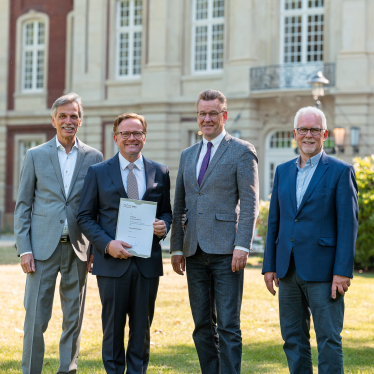Appointment of Prof. Dr. Jan vom Brocke

Rector Prof. Dr. Wessels appoints Prof. Dr. Jan vom Brocke as Professor of the University of Münster on June 12, 2023, effective August 1, 2023. The Dean of the Faculty of Business and Economics, Prof. Dr. Gottfried Vossen, and the Managing Director of the Department of Information Systems, Prof. Dr. Dr. h.c.. Jörg Becker, cordially congratulate Prof. Dr. Jan vom Brocke on his appointment earlier this week at Münster Castle. "I am very pleased that we have been able to bring Jan vom Brocke to the University of Muenster School of Business and Economics" said Prof. Dr. Gottfried Vossen. Prof. Dr. Jörg Becker affirms with this. "I am deeply convinced that Jan vom Brocke will provide us with many new impulses for the field of Information Systems and the ERCIS network."
Jan vom Brocke is a highly renowned international scholar in the field of Information Systems, and he is specifically well known in the area of Business Process Management. He regularly publishes in A and A+ as well as Financial Times Top 50 journals. At the same time, Jan vom Brocke is known for his research of high economic and social relevance: He is an active member of the Design Science community, where he is also involved in developing innovative digital systems for sustainable and energy-efficient processes. To this end, he also works with both governments and companies in a variety of industries.
Prof. Dr. Jan vom Brocke will succeed Prof. Dr. Dr. h.c. Jörg Becker, and he will become a new director at ERCIS – The European Research Center for Information System. In this role, Jan vom Brocke will actively contribute to the internationalization strategy of the faculty. "Returning to my alma mater is of course very special to me: Münster is one of the top locations for Information Systems research and eduction, and I feel a deep connectedness and appreciation towards the university so rich in tradition, the inspiring colleagues and the very committed students. At the same time, I see great potential to further develop Münster and the ERCIS Network. I am very grateful for the already noticeable openness to welcome new ideas and to go forward implementing them together.
Jan vom Brocke is an alumnus of the University of Münster, where he studied Information Systems from 1992 - 1998, completed his doctorate with Prof. Dr. Heinz Lothar Grob from 1998 - 2002 and earned his habilitation at the Faculty of Economics in 2007. He has since held the Hilti Chair for Business Process Management and was Director of the Institute of Information Systems at the University of Liechtenstein. During this time, he and his team were also Associate Partners in the ERCIS network and engaged in several joint research projects, publications, teaching events and conferences. Since 2020, he has also been co-leader of the ERCIS research cluster "Process Science".
In recognition of his achievements, Professor Jan vom Brocke was named a Fellow of AIS in 2019 and became a Member of the AIS College of Senior Scholars. He is also a Fellow at the ESCP Center for Design Science in Entrepreneurship (since 2021) and has been appointed Schoeller Senior Fellow and Friedrich Alexander University (since 2022) as well as a member of the Academy of Sciences in Liechtenstein (since 2020). Independent international rankings consistently place Jan vom Brocke in top positions in both the field of Information Systems as well as in Management. Stanford University research on the impact of scientists worldwide regularly lists Jan vom Brocke among the top 1% of scholars across all disciplines.
Jan vom Brocke brings teaching experience from international business schools, in particular the University of St. Gallen in Switzerland and University College Dublin in Ireland. He is also involved in the development of educational software, case study books and reference curricula and served as Vice President for Education of the AIS – the Association for Information Systems. Jan vom Brocke has received several international teaching awards, most notably the AIS Award for Outstanding Contribution to Information Systems Education.
In Münster, Jan vom Brocke will strongly drive process research, particularly establishing the new research field of "Process Science”: The analysis of digital traces of actors and systems makes it possible today to capture and analyze processes in all areas of life and work and to innovate processes that set new standards in economic, ecological and social terms. Together with international colleagues from various disciplines, Professor vom Brocke will establish the world's first Open Process Science Platform in Münster. The idea is to create an open platform that continuously records digital process data in order to subsequently analyze it using Process Science methods. That way, “process patterns” are identified that provide insights not seen before, e.g., of inefficiencies, risks, but also sustainability effects. Professor vom Brocke`s research provides great potential for cooperation with existing initiatives at the University of Münster, including the Center for Business Transformation in Times of Radical Change (ChanCe) as well as with MEET Battery Research Center Münster and Fraunhofer FFB.
Moreover, Professor vom Brocke has plans for innovation in teaching. At the University of Münster University, he will create design-oriented learning spaces: students learn through projects in which they use modern technologies to solve real-world problems of social and economic relevance. Involved in Design Labs students will acquire important dynamic capabilities: Students learn how to solve problems that are not yet known today, using technologies that are also not yet invented today. Design-oriented teaching spaces offer many cooperation opportunities with the EUREGIO Start-up Center REACH through new prototypes and business models, especially as they use innovative technology such as blockchain, robotics and artificial intelligence. Furthermore, Professor vom Brocke plans to use the ERCIS network to connect the learning spaces in Münster with other locations and thus further increase internationalization in teaching as well.

